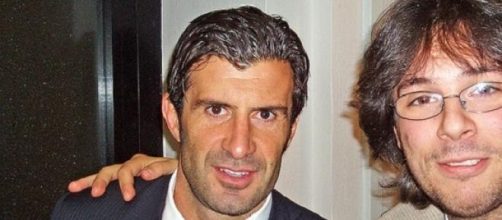The election for the post of new Fifa president has begun to hot up, with one of the candidates, Luis Figo setting out his ideas should he be successful in ousting the current incumbent Sepp Blatter. Speaking at the release of his manifesto held at Wembley Stadium, the former Portuguese international made it clear that one of the areas he would be considering for changes, would be the likely size of future World Cups. He believes that the current number of teams that participate in the finals is too small, with a better representation resulting from as many as 40 or maybe even 48 teams being involved.
With the finer details of Figo's suggested World Cup expansion still seemingly a little bit hazy, he offered another alternative in terms of two 24-team competitions to run in parallel on two continents, which would then come together for a knockout phase in one nation.
In an intriguing presentation, Figo also suggested a number of other 'new' initiatives that could be considered, such as sin-bins as are commonly utilised in other sports (such as rugby and hockey) and a reversion to the offside rule interpretation that was observed in the past. Further proposals included a redistribution of Fifa's revenue to fund grassroots football.
With many football associations across the world, especially in Europe, believing that the time has come for the 78-year-old Mr Blatter to move aside and let a younger man with a fresh approach take over the reins of the prestigious post, Figo would certainly make an interesting choice as an alternative.
At just 42, he has youth on his side and perhaps a closer connection to today's footballing culture. He is also well-respected for his ability as a player in the game, having played at two World Cups and being named the 2001 Fifa world player of the year.
The current Fifa president was elected back in June 1998, when he succeeded Joao Havelange. He has since been re-elected on three separate occasions and seems as keen as ever to remain in the post, despite his advancing years (which by itself is no reason he should not be re-elected) and also what seems to have been a sense of unease in recent years at his methods of leadership of the organisation. Never one to shy away from potential controversy, Mr Blatter was once believed to have berated a referee in the 2006 World Cup, who seemed to brandish a mass of yellow and red cards in a match, by suggesting that the official should also have booked himself.
He regretted his choice of words at the time, but his intention to officially apologise to the man concerned was never forthcoming and the referee did not officiate further.
The election on 29th May will feature two other candidates besides Figo and Blatter, with Prince Ali bin al-Hussein of Jordan and Michael van Pragg of the Netherlands (the Dutch FA chairman) also involved in the race for the presidency. Prince Ali is thought by many to be the most likely to seriously challenge Blatter, although it is expected to be a difficult challenge for him to break the likely stranglehold that the Swiss man enjoys over the votes from Africa and CONCACAF. Even some of the votes within Europe may favour the other two candidates above Prince Ali. Whoever wins the election will be confirmed for a four-year presidential term.

